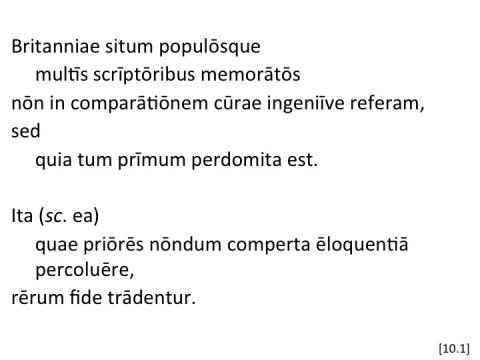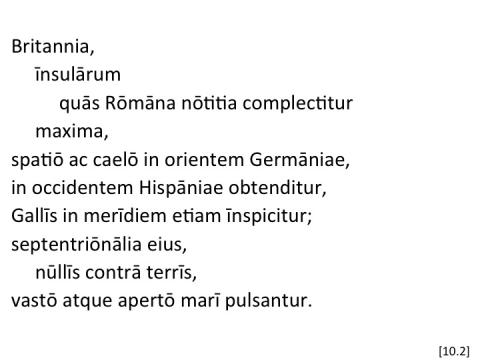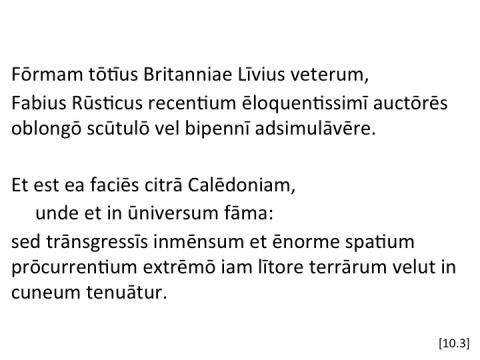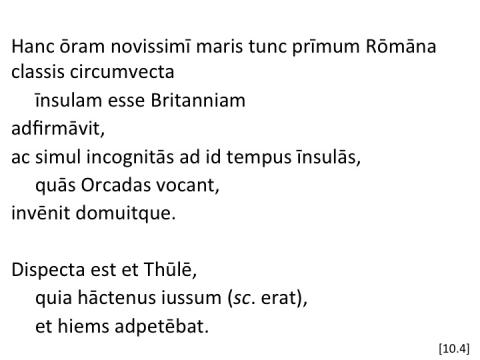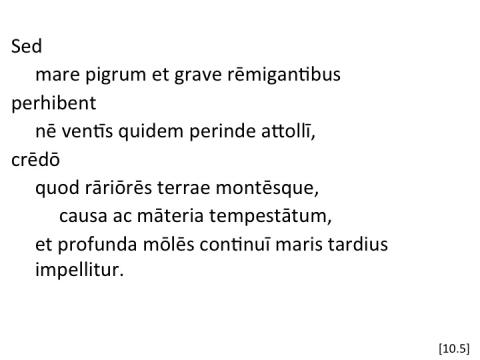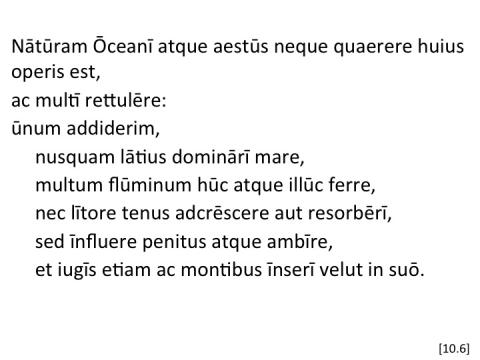[10.1] Britanniae situm populōsque multīs scrīptōribus memorātōs nōn in comparātiōnem cūrae ingeniīve referam, sed quia tum prīmum perdomita est. Ita quae priōrēs nōndum comperta ēloquentiā percoluēre, rērum fide trādentur. [10.2] Britannia, īnsulārum quās Rōmāna nōtitia complectitur maxima, spatiō ac caelō in orientem Germāniae, in occidentem Hispāniae obtenditur, Gallīs in merīdiem etiam īnspicitur; septentriōnālia eius, nūllīs contrā terrīs, vastō atque apertō marī pulsantur. [10.3] Fōrmam tōtīus Britanniae Līvius veterum, Fabius Rūsticus recentium ēloquentissimī auctōrēs oblongō scūtulō vel bipennī adsimulāvēre. Et est ea faciēs citrā Calēdoniam, unde et in ūniversum fāma: sed trānsgressīs inmēnsum et ēnorme spatium prōcurrentium extrēmō iam lītore terrārum velut in cuneum tenuātur. [10.4] Hanc ōram novissimī maris tunc prīmum Rōmāna classis circumvecta īnsulam esse Britanniam adfirmāvit, ac simul incognitās ad id tempus īnsulās, quās Orcadas vocant, invēnit domuitque. Dispecta est et Thūlē, quia hāctenus iussum, et hiems adpetēbat. [10.5] Sed mare pigrum et grave rēmigantibus perhibent nē ventīs quidem perinde attollī, crēdō quod rāriōrēs terrae montēsque, causa ac māteria tempestātum, et profunda mōlēs continuī maris tardius impellitur. [10.6] Nātūram Ōceanī atque aestūs neque quaerere huius operis est, ac multī rettulēre: ūnum addiderim, nusquam lātius dominārī mare, multum flūminum hūc atque illūc ferre, nec lītore tenus adcrēscere aut resorbērī, sed īnfluere penitus atque ambīre, et iugīs etiam ac montibus īnserī velut in suō.
notes
Overview: The Geography of Britain (Stuart) On the relevancy and purpose of the following chapters (10-13), dealing with the geography and ethnography of Britain, see Introduction p. xiv. (Gudeman)
10.1
multīs scrīptōribus: dative. See note on 2.1. ... Besides Livy and Fabius Rusticus (see below), Julius Caesar (in the Gallic War, Book 5), Pomponius Mela, a geographical writer of the time of Claudius, Pliny the Elder, the uncle of Tacitus's friend, had written of the country and the people of Britain. Pytheas of Massilia, a traveler contemporary with Alexander the Great, first acquainted the Greeks with Britain. His work furnished much material for subsequent writers. (Stuart) [A&G §375]; of Greek writers, Pytheas, Timaeus, and Strabo; of Roman writers, Caesar, Livy, Pomponius Mela, Fabius Rusticus, and the elder Pliny had written about Britain. (Pearce); among the writers probably referred to, besides the two mentioned, were Pytheas, Posidonius, and Sallust. (Gudeman)
10.1 nōn in comparātiōnem: “not in order to challenge comparison (with them) in respect to,” + objective gen. Nōn looks forward to sed quia. (Francese) [A&G §347-48] cūrae: historical accuracy and painstaking. (Stuart) ingeniī: literary ability shown in attractive presentation of data. (Stuart) cūrae ingeniīve: i.e. diligence in amassing material and ability in making use of it. (Pearce); as Tacitus's predecessors are said to have covered up their ignorance by rhetorical embellishment, curae cannot designate, as it frequently does elsewhere, laborious research, but is here synonymous with ars, which is frequently contrasted with ingenium or natura. (Gudeman)
quia ... perdomita est: Tacitus's personal interest in geography and ethnology was a leading motive. See Introduction, p. xviii. (Stuart)
priōrēs: particularly Livy and Fabius Rusticus, and possibly Posidonius, but not Caesar, to whom eloquentia percoluere would be inapplicable. (Gudeman)
ēloquentiā: ablative of means with percoluere. (Pearce) [A&G 409] percoluēre: the verb elsewhere means "to honour"; here "to adorn." (Pearce) ēloquentiā percoluēre: with a slightly contemptuous force, "have tricked out with the ornaments of rhetoric." (Stuart)
rērum fide: Tacitus, of course, was able to utilize the personal observations of Agricola. (Stuart)
10.2
nōtitia: "information," the word implying a more or less superficial knowledge, as contrasted with scientia. (Gudeman)
spatiō ac caelō: spatium signifies terrestrial extent; caelum, the commensurate quarter of the heavens above the island, means geographical situation mathematically determined. (Stuart); "in extent and direction," i.e., its eastern and western coastlines were equal to, and ran towards the same points of the compass as the western and eastern coastlines of Germany and Spain respectively. Tacitus imagined the eastern coast of Britain to run parallel to the coast of Germany (which included Jutland and Scandinavia), and the western coast to run parallel to the coast of Spain, which was thought by the Ancients to run northwards instead of westwards. (Pearce); "geographical location." Caelo is added to spatio by way of nearer definition, the land and sky being co-extensive. (Gudeman)
Germāniae: take as dative with obtenditur. (Stuart) [A&G 370]
in occidentem Hispāniae: by a curious error the ancient geographers in imagination prolonged the Iberian Peninsula to the north and west and conceived of southern England as partly inclosed in the bay thus formed. (Stuart)
obtenditur: "lies over against." (Stuart); "faces." The ancients erroneously conceived Spain as stretching farther west and north, so that Britain was northeast of it and Ireland due north. (Gudeman)
Gallīs: subjective dative. See note on 2.1. (Gudeman) [A&G §375]
etiam: strengthens inspicitur, as opposed to the less demonstrable statement spatio ac caelo ... obtenditur. (Pearce)
īnspicitur: "lies in sight of." The white cliffs of England are plainly visible from Calais, but are not discernible at all points of the French coast, as Tacitus implies under the hallucination that the Gallic coast stretched to the west, parallel to the southern shoreline of England. (Stuart); the underlying conception being that the entire southern coast of Britain ran parallel to the northern boundary of Gaul. (Gudeman)
nūllīs contrā terrīs: abl. of attendant circumstances. contra is predicative. (Pearce) [A&G §420.5]; the ablative absolute is elliptical, positis being understood with contra. See 11.2, posita contra Hispania, and Introd. p. xxxi, #6. (Gudeman)
vastō atque apertō: standing expressions for the surprise aroused in the Roman by the sight of the Atlantic. (Stuart)
10.3
Līvius: we learn from the extant epitome that Livy treated Caesar's invasion of Britain in the lost 105th book. A description of the country was doubtless included. (Stuart)
Fabius Rūsticus: a writer of the time of Nero and a friend of the philosopher Seneca. His history, which is also referred to in the Annals, comprehended, besides the reign of Nero, probably that of Claudius. Here some account of Britain would be in place. (Stuart); author of a history of his own times, which is cited by Tacitus as one of his sources for the reign of Nero (Ann. 13.20). ... A Fabius Rusticus, together with Pliny and Tacitus, is mentioned as one of the heirs in the will of Dasumius (written 108 CE). If he be the same as the historian, the present passage would furnish the only instance in Tacitus in which a writer still living is cited as a source. (Gudeman)
ēloquentissimī auctōrēs: "consummate stylists." As the context proves, auctor is here used without the accessory meaning of trustworthiness. (Gudeman); see note on eloquentia above. (Pearce)
oblongō scūtulō is an emendation that substitutes the diminutive form of scutum ("shield") for the manuscripts' nonsensical terms; other emendations are possible. (Damon) oblongae scutulae vel bipennī: previous writers, Caesar among them, had described the shape of Britain as triangular. Livy and Rusticus espoused a new theory. The shape of the scutula is in doubt; however, the use of vel indicates that its contour at least approached the familiar outlines of the double battle-ax with its two heads, fitted back to back, broad at the edge and converging regularly toward the shaft. ... Such similes are a feature of ancient geography. Thus the Peloponnesus was compared to the leaf of a plane tree, oases in a desert to spots on a leopard's skin. Like our childish comparison of Italy with a boot, such likenesses are at best rough and in ancient times were founded on imperfect knowledge. (Stuart) bipenni: an axe with a fan-shaped blade. As Caesar and Mela speak of Britain as triangular, we may suppose Rusticus had a single axe-head in mind, the southern coast corresponding to the spreading blade, and the narrow isthmus between Forth and Clyde to the part to which the handle is fixed. (Pearce)
adsimulāvēre: a plural predicate after two singular subjects in adversative clauses is one of the characteristic features of Tacitean usage. Here the incongruity is all but done away with by the plural apposition. (Gudeman)
et est: as Tacitus admits the similarity to a bipennis, if Caledonia is disregarded, and as he knew of the narrowing of the land at the isthmus of the Forth and Clyde, it is evident that he understood a single axe-head by the word. (Pearce) et: "and as a matter of fact." This asseverative use of et, at the beginning of a sentence, is common in Tacitus. (Gudeman)
citrā Calēdoniam: excluding Scotland. The comparison with the double ax had been applied at a time when the northern part of Britain was an unknown land. On the basis of the scientific data gained by Agricola's exploring fleet Tacitus shows that the likeness cannot be extended to the whole island because Scotland is wedge-shaped; its contour thus approximately reverses the ax-head. (Stuart)
unde et in ūniversum fāma: "whence it is that the report has been made applicable as well to the island in its entirety." (Stuart); in universum is equivalent to an adverb, "generally." (Pearce) unde: sc. oriebatur. With unde (18 instances), and similarly with hinc, inde, ex eo, and the like, Tacitus omits the verb. (Gudeman) in ūniversum fāma: i.e. the erroneous notion gained general acceptance that the entire island, including Caledonia, had the shape spoken of. (Gudeman) fama sed: between fama and sed the manuscript contains some words repeated from earlier in the sentence: fama est transgressis unde et universis fama sed. The scribe marked the words after transgressis as problematic by underlining them, and editors emend variously. The emendation adopted here assumes that fama est displaced fama sed; the editor therefore excises both the repeated words and the interloper est. (Damon)
trānsgressīs: i.e. the border; the dative expresses the point of view. (Stuart) [A&G §378]; translate "when you have crossed," viz. into Caledonia. (Pearce); see note on 11.3. (Gudeman)
inmēnsum ... tenuātur: two separate and independent characteristics, viz. of size and shape, are compressed into the one sentence. There is an enormous stretch of land, and this tapers to a point. (Pearce) ēnorme spatium: "a shapeless tract." (Stuart) inmēnsum ... spatium: the phrase occurs in five other places in Tacitus. Under the influence of Vergil he develops an increasing fondness for inmensus, inmanis, ingens, using them generally in the sense of magnus. (Gudeman) ēnorme: here "shapeless," but usually synonymous with immensus. (Gudeman)
extrēmō iam lītore: "where the shore seems already to end." One following the coastline of the island might imagine that the deep indentation of the Forth or the Clyde marked the end of the land. (Stuart); a sort of ablative of accompaniment with procurrentium, "jutting out with what is really the furthest sea-board," i.e. jutting out where the coast actually ends. iam marks the contrast with the apparently natural ending of the land at the isthmus. (Pearce) lītore ... tenuātur: a dactylic hexameter. Verses in prose, whether complete or partial, are severely censured by the ancients, and but few genuine instances occur, the rhythmical cadence being in the majority of cases not felt, if the sentence is properly read. On the conciseness of expression, see lntrod. p. xxxiii, #10. (Gudeman)
velut in cuneum: Tacitus applies to Scotland approximately the triangular description which Caesar, Mela, and Pliny applied to the whole island. (Stuart)
10.4
hanc ōram novissimī maris: i.e. the northern coast of Scotland; novissimus = "remote." (Stuart)
circumvecta: the voyage is described in 38.3. (Stuart)
adfirmāvit: "confirmed"; for that Britain is an island had been asserted by Pytheas and others, but Agricola's fleet first demonstrated it. It is to this achievement that the only ancient author, besides Tacitus, who mentions Agricola, refers. See Dio Cass. 56.20. (Gudeman)
Orcadas: i.e. the Orkneys. (Gudeman)
incognitās: the Orkneys had been mentioned by Mela, so incognitas probably means merely "unexplored." (Pearce)
invēnit: used also, 33.3, of acquiring thorough acquaintance with a land already known. (Stuart)
dispecta: "was descried in the distance"; but, unlike the Orkneys, Thule was not subdued, because they had no orders to do so, and even if they had, the approaching winter would have made it inexpedient to attempt its subjugation, the tacit assumption being that the Romans would have had no difficulty in accomplishing the task. The verb at the beginning, and at the same time in juxtaposition with domuit, skillfully emphasizes the antithesis. (Gudeman)
Thūlē: the "farthest North" of the ancients, celebrated in fable and in poetry. (Stuart); first mentioned by the distinguished navigator, Pytheas of Massilia (4th cent. BCE), and regarded by the ancients generally as the most northerly point of the earth, hence ultima Thule (Verg. Georg. I.30). It was said by Pytheas to be six days' sail from Britain, the night and day being six months long. Hence it has been rashly identified by some with Iceland. The island here referred to was probably Mainland, the largest of the Shetland group. It can be seen from the Orkneys. (Gudeman)
hāctenus iussum: sc. erat. The infinitives supplied by Stuart (see note below) are complementary. (Damon); supply ire or progredi. Agricola had ordered the fleet to establish the location of Thule, but not to land. (Stuart)
et hiems adpetēbat: the fleet did not start until the decisive battle of the summer campaign of 84 had been fought and won. (Stuart) hiems: on the date see the Introduction. (Damon) [INTXRF] et: et praeterea. (Gudeman)
10.5
sed: resumes after the digression. (Pearce)
mare pigrum: the legend of an inert sea had persisted from the time of Pytheas, who speaks of a frozen ocean and describes the region about Thule as a kind of protoplasmic mass resembling a jellyfish. A rationalistic explanation of the story might lie in masses of floating ice, an unwonted sight to dwellers by the Mediterranean. (Stuart) pigrum: perhaps refers to the difficulties of northern navigation, and in particular to "the belt of calm and fog surrounding the south of Shetland," and "the contrary tides and currents off N.E. Scotland" (Furneaux). Perhaps it is merely a theoretical. (Pearce) mare pigrum: on the brachylogy in this clause, see lntrod. p. xxxiii, #10. (Gudeman)
nē ... perinde: "not ... in the same manner" (as seas elsewhere; the second member of the comparison is omitted); hence, "not ... especially." (Stuart) perinde: "correspondingly," i.e. to the nature of the water; so perinde attolli = "is not raised to any great height." (Pearce); sc. ac cetera maria. (Gudeman); is an emendation of the manuscript's proinde; the two terms are frequently confused by scribes, who generally abbreviate both. (Damon)
rāriōrēs: used predicatively, though in attributive position (= rarius occurrunt), and correlative with tardius, for the apposition causa, etc., can apply only to terrae montesque. The construction is exceedingly common in Tacitus. (Gudeman)
causa ac māteria tempestātum: the origin of the winds was a stock topic in the works of ancient physicists and philosophers, some of whom, notably Aristotle, closely approximated the true explanation. According to the theory here adopted by Tacitus with small credit to his scientific knowledge, storms were caused by streams of air which were compressed by the obstruction of mountains or gathered in clefts of the earth and which then rushed forth with a rotary motion imparted by the contact with the opposing objects. (Stuart)
continuī maris: on the contrary the wind gets a greater sweep on the open sea and the waves are higher. (Stuart)
impellitur: sc. ventis. (Pearce)
10.6
nātūram: "natural characteristics." (Stuart)
aestūs: this phenomenon was naturally a source of astonishment to the Romans, as there are scarcely any tides in the Mediterranean. (Gudeman); parallel to Oceani, not naturam. (Damon)
neque ... ac: a rare combination, like -que ... ac. Instead of going on with something like "nor is it worth while, because many," Tacitus changes the construction to "and indeed many." (Pearce); "does not fall within the scope of this work and besides." (Gudeman)
multī rettulēre: the cause of the tides was a commonplace of ancient scientific investigation. The influence of the moon on the tides was observed by Pytheas. Naturally the ebb and flow of the Atlantic were interesting phenomena to the Greeks and the Romans, since the Mediterranean is in most places a tideless sea. (Stuart)
addiderim: "I might add." (Stuart) [A&G 447.3]; because based on authentic information acquired in these expeditions, and doubtless communicated to the author by Agricola himself. (Gudeman)
flūminum: the currents caused by the inrush and the outgo of the tide. In the deep indentations of the Scottish coast the effect of the ebb and flow is particularly visible. Italy has no deep bays. Greece has many gulfs and firths, but no tide. Keep mare as the subject of the infinitives. (Stuart) multum flūminum hūc atque illūc ferre: "many currents set in various directions"; ferre being intransitive. Or of course mare may be the subject. (Pearce) flūminum: "waters." (Gudeman) hūc atque illūc ferre: "ebbs and flows," i.e. the high tides send huge volumes of water far up the friths and rivers, and on receding at low tide leave the channel all but dry. (Gudeman)
lītore: the outer coast line. (Stuart) lītore tenus: "merely as far as the coast." (Pearce)
īnserī: a middle use of the passive infinitive; "penetrates." (Stuart) [A&G 156a]
in suō: i.e. regno; the metaphor in dominari is repeated. (Stuart) velut in suō: "as though in its own province." (Pearce); as if they were still a part of the ocean's bed. (Gudeman)
vocabulary
Britannia –ae f.: Britain
scrīptor –ōris m.: writer
memorō memorāre memorāvī memorātus: to relate, mention
comparātiō comparātiōnis f.: comparison
perdomō perdomāre perdomuī perdomitum: to subdue completely
comperiō comperīre comperī compertus: to find, ascertain
ēloquentia –ae f.: eloquence, oratory, correct speech
percolo percolere percolui percultum: to embellish
Rōmānus –a –um: Roman
nōtitia ae f.: knowledge
complector complectī complexus sum: to embrace, include, hold fast
māximus –a –um: greatest; maxime: most, especially
oriēns –entis m.: the east
Germānia –ae f.: Germany, the Roman province; Germany proper
occidēns –entis: the west
Hispānia –ae f.: Spain
obtendō –ere –tendī –tentus: to stretch opposite
Gallus –a –um: Gallic, pertaining to Gaul; (as a noun) a Gaul
merīdiēs merīdiēī m.: the south
īnspiciō –ere –spexī –spectus: to behold
septentriōnālis –e: northern
vāstus –a –um: dreary, desolate, wide
apertus aperta apertum: open
pulsō pulsāre pulsāvī pulsātus: to hit
Līvius –ī m.: Livy, the historian
Fabius –iī m.: Fabius Rusticus
Rūsticus –a –um: Rusticus (a cognomen)
ēloquēns –entis: eloquent
oblongus –a –um: oblong
scūtum scūtī n.: shield (oblong, made of wood and leather)
bipennis –e: two-headed axe
adsimulō adsimulāre adsimulāvī adsimulātus: to liken, compare
citrā: on this side of (+acc.)
Calēdonia –ae f.: Caledonia, Scotland
ūniversus –a –um: all together, the entire; (in universum) in general
trānsgredior –gredī –gressus sum: to cross over
immēnsus –a –um: boundless, immense
ēnōrmis –e: unusually great, enormous
prōcurrō –currere –cucurrī –cursus: to project
cuneus –ī m.: wedge
tenuō tenuāre tenuāvī tenuātus: to make thin, narrow
ōra –ae f.: shore
Rōmānus –a –um: Roman
circumvehor circumvehī circumvectus sum: to sail round
affīrmō affirmāre affirmāvī affirmātus: to assert, declare, state
incognitus –a –um: unknown
Orcas Orcadis f.: Orkneys
domō domāre domuī domitus: to subdue
dispiciō –ere –spexī –spectus: to descry
Thūlē –es f.: Thule
hāctenus: so far
appetō appetere appetīvī appetītus: to aim at, seek, covet; (intrans.) to approach
piger pigra pigrum: sluggish
rēmigō rēmigāre –āvī –ātus: to row
perhibeō –ēre –uī –itus: to relate, state
perinde: equally, as much
attollō attollere: to lift, raise, enlarge upon
quod: in that, the fact that, because
profundus –a –um: deep
mōlēs mōlis f.: mass, weight
continuus –a –um: uniterrupted, unbroken
impellō impellere impulī impulsum: to drive, charge, push forward
ōceanus –ī m.: Ocean (esp. the German Ocean)
aestus aestūs m.: tide
nusquam: nowhere
dominor dominārī: to act as lord, be master
tenus: as far as (with a preceding abl. or gen.)
accresco (or adcresco) accrescere accrēvī accrētum: rise with the tide
resorbeō –ēre: to suck back; (pass.) ebb
īnfluō –fluere –flūxī –flūxum: to flow, flock in
penitus or penitē: far within, deeply
ambiō –īre –īvī or iī –ītus: to go round, go in and out
īnserō īnserere īnseruī īnsertus: to push, thrust in

